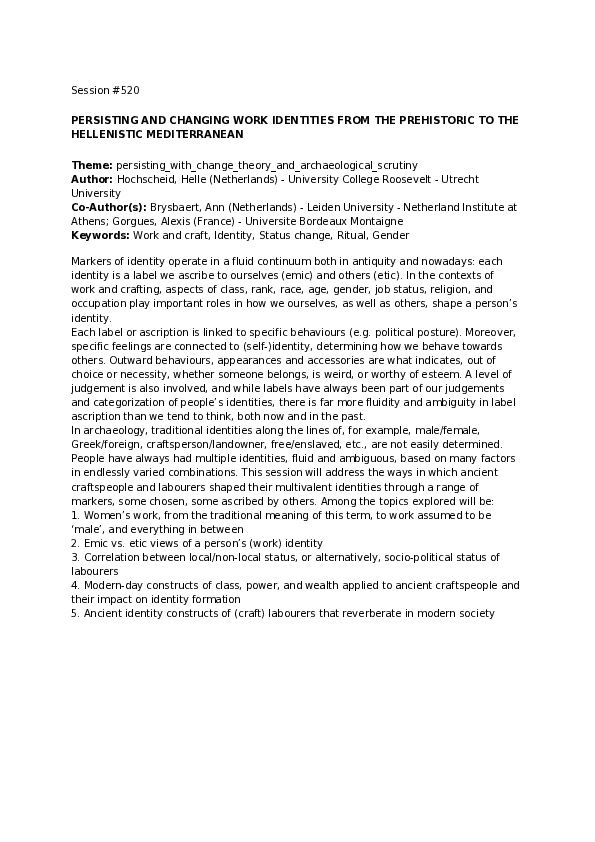Academia.edu no longer supports Internet Explorer.
To browse Academia.edu and the wider internet faster and more securely, please take a few seconds to upgrade your browser.
EAA 2024 Rome - session520 persisting and changing work identities from the Prehistoric to the Hellenistic Mediterranean
EAA 2024 Rome - session520 persisting and changing work identities from the Prehistoric to the Hellenistic Mediterranean
2024, EAA 2024 Rome session #520
Related Papers
Work, Labour, and Professions in the Roman World
Constructing Occupational Identities in the Roman World2016 •
This paper focuses on the materialization of technological practices as a form of identity expression. Contextual analyses of a Mycenaean workshop area in the Late Bronze Age citadel of Tiryns (Argolis, Greece) are presented to investigate the interaction of different artisans under changing socio-political and economic circumstances. The case study indicates that although certain technological practices are often linked to specific crafts, they do not necessarily imply the separation of job tasks related to the working of one specific material versus another. Shared technological practices and activities, therefore, may be a factor in shaping cohesive group identities of specialized artisans. Since tracing artisans' identities is easier said than done on the basis of excavated materials alone, we employ the concepts of multiple chaînes opératoires combined with cross-craft interactions as a methodology in order to retrieve distinctive sets of both social and technological practices from the archaeological remains. These methodological concepts are not restricted to a specific set of steps in the production cycle, but ideally encompass reconstructing contexts of extraction, manufacture , distribution and discard/reuse for a range of artefacts. Therefore, these concepts reveal both technological practices, and, by contextualising these technological practices in their spatial layout, equally focus on social contacts that would have taken place during any of these actions. Our detailed contextual study demonstrates that the material remains when analysed in their entirety are complementary to textual evidence. In this case study they even form a source of information on palatial spheres of life about which the fragmentary Linear B texts, so far, remain silent.
2017 •
In prehistoric Europe hierarchic societies arose and developed technological systems and processes in the production of objects related to everyday use, on the one hand, and items of religious and symbolic character emulating prestige and luxury, on the other, while both types of objects may not always be clearly distinguishable. This volume deals with questions of how artisans and other social groups, involved in these productive processes and social practices, reacted to and interacted with the demands connected with elites identities formation, affirmation reconfirmation practices. Innovations and the development of new technologies designed to satisfy the needs of ostentatious behaviour and achieving prestige are key issues of this volume. For example, how can we identify the consequences of such processes, how can we define the role(s) that the craftspeople played in such contexts, and are these always as clear-cut as usually portrayed? The book's common aim is to investigate the economic, socio-political, as well as the technological contexts and backgrounds of the make-up of material culture and technologies in these periods. We examine which role(s) artisans may have played in status and identity formation processes, in rituals and in symbolic performances, in other words, in each aspect of life and death of selected Chalcolithic, Bronze and Iron Age populations in Europe. Many aspects of the social interaction patterns between the different groups of people in those periods have not been adequately discussed and investigated, especially the artisans' important role(s). This volume aims to redress these imbalances by investigating how social groups interacted with each other, and how we may recognize such interactions in the material remains.
Ancient History Bulletin Online Reviews
Unravelling past identities in postmodern times Review of T. Hodos & S. Hales (eds.). Material Culture and Social Identities in the Ancient World . Cambridge/New York: Cambridge University Press, 2010.2011 •
Gendered Labor in Specialized Economies: Archaeological Perspectives on Female and Male Work
The Artisans of Terminal Classic Xuenkal, Yucatan, Mexico: Gender and Craft during a Time of Economic Change2016 •
RELATED PAPERS
Food Science & Technology
In Vitro Digestibility and Physicochemical Properties of Potato (Solanum tuberosum) Fermented by Traditional and Alternative Processes under Water Currents2023 •
2019 •
Logic and Logical Philosophy
Theory of quantum computation and philosophy of mathematics. Part I2010 •
Israel im liminalen Raum
Israel im liminalen Raum. Das Babylonische Exil als Übergangsprozess im Ezechielbuch2023 •
2019 •
Pediatrics
Chronic Recurrent Multifocal Osteomyelitis and Thalidomide in Chronic Granulomatous Disease2016 •
2017 •
2017 •
Etsi Deus non daretur… Scritti in onore di Serenella Armellini
L’importanza dell’altro. La metodologia conoscitiva tommasiana nel contesto del processo2023 •
Revista Gestão & Sustentabilidade Ambiental
Aplicação Da Fibra De Coco No Processo De Isolamento Termo Acústico2015 •
2019 •
Marine Ecology Progress Series
Effects of in situ experimental shading on the Mediterranean seagrass Posidonia oceanica2001 •

 Helle Hochscheid
Helle Hochscheid Ann Brysbaert
Ann Brysbaert Alexis Gorgues
Alexis Gorgues